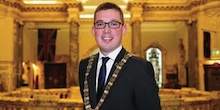
When I first heard the news that Sinn Fein councillor Niall O’Donnghaile was elected Lord Mayor of Belfast I thought of the impact it would have on the community he is from - the same community I am from - the people of the Short Strand/Ballymacarrett. The word that struck me immediately was “homecoming”.
Homecoming because Niall O Donnghaile represents a community who for almost 100 years were forced to live in political exile in their own country in an apartheid, one-party unionist state. They experienced the sharp edge of a unionist government determined to reduce the nationalist people to little more than economic migrants, with no rights. No right to a job, a home, a vote, a cultural identity.
Jobs only for unionists, ‘no Catholic need apply’ was the unionist state’s motto. And on the heels of economic discrimination was the violence of the state with its pogroms which left this community ever vigilant, ever fearful.
But also, ever alert, because sectarian discrimination taught them to organise, to utilise their own resources in all areas of their lives.
And when they needed to defend themselves against the violence of the state they organised the IRA and auxiliary defence forces. They paid a heavy price for standing up for their rights in terms of loss of life and political imprisonment; others also lost their lives through IRA actions.
Mayor O Donnghaile is a son of the community’s resilience and determination. Both his parents are former political prisoners as were his uncles on both sides.
His paternal grandmother and maternal grandfather were dedicated republicans. His grandfather was interned on the prison ship Al Rawdah in the 1940s. While there he learned Irish and in recognition of his achievement the other political prisoners presented him with a Fainne made from the ship’s copper pipes. When he was released Niall’s grandfather had the Fainne dipped in gold. The night he was elected mayor Niall proudly wore his grandfather’s Fainne Or (gold Fainne) on his lapel.
Niall and his two brothers were educated through the medium of Irish and all are university educated. His is the new face of a new generation of republicans born in times of war but matured politically in times of peace. While serving to the highest standard all the people of Belfast, Niall’s youth and his Irish language fluency will mean that these two categories of people will feature highly in his term of office.
Two important factors made his election possible: Sinn Fein, with sixteen councillors, is the largest party on Belfast City Council (an amazing achievement for Belfast republicans) and the council operates a fair system of power-sharing based on a voting procedure known as d’Hondt. And while there was some token resistance from some unionist councillors to Niall’s election it is clear that unionists know equality is in the ascendancy.
Some like those unionists on Lisburn council still think they can turn a deaf ear to the sound of equality knocking on their door. But even they have had to succumb to the pressure of change. SDLP councillor Brian Heading was elected mayor and Sinn Fein was offered more representation on the council than ever before. The essential next step is the council adopting the d’Hondt system. Then nationalists’ rights will be enshrined in legislation and not subject to unionist rivalry or dubious side-deals.
And it is not only the unionists who have to learn new thinking for these new times. Some political parties and sections of the media are fighting old battles against Sinn Fein long ago lost. The row about Sinn Fein’s adviser to Caral ni Chuilin is the most recent example.
And while Mary Travers’ family are entitled to say whatever they believe, those anti-republican critics said little about the knighting of Colonel Wilford, the commander of the Paras in Derry on Bloody Sunday, the promotion of RUC officer Jimmy Crutchley following his involvement in the killing of mother of three Nora McCabe, or the early release and promotion in the Paras of Lee Clegg who killed Karen Reilly. These were deeply offensive to nationalists. It seems that Sinn Fein alone is subject to a contrived test of its commitment to reconciliation while others are not.
![[Irish Republican News]](https://republican-news.org/graphics/title_gifs/rn.gif)
![[Irish Republican News]](https://republican-news.org/graphics/title_gifs/harp.gif)

